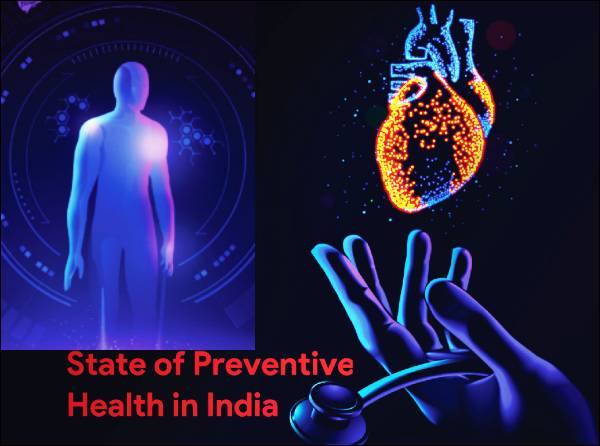
July 21, 2022: India’s preventive healthcare sector, which includes fitness and wellness, foods and supplements, early diagnostics and health tracking among others, is projected to reach USD $197 billion by 2025, growing at a CAGR of 22%.
This is the key finding in a report released by strategy consulting firm Redseer Strategy Consultants in collaboration with Chiratae Ventures and Amazon Web Services (AWS.
India has traditionally focused on curative care as opposed to preventive care. However, since the COVID-19 pandemic, preventive care has increased in importance across the Indian population. A survey conducted with over 1,000+ individuals reveals that at least 40% of the respondents were highly inclined towards preventive health. Another survey conducted with a group of 300+ Health-Conscious Individuals (HCIs)* reveals that they actively track different aspects of their health such as lifestyle, physical wellness, and more, to maintain and prolong wellness. These HCIs are familiar with health monitoring devices and apps and use them regularly to monitor their health. Further, the study revealed that these HCIs spend on an average between INR 4,000 and INR 10,000 on various preventive healthcare practices annually, and are also willing to pay up to 50% more in the future.
Says Amitabh Kumar, Senior Manager, Redseer Strategy consultants:“Startups can unlock the potential of preventive healthcare in India by focusing on 3A’s - Awareness, Accessibility, and Affordability from a consumer point of view. Creating more HCIs, tapping into existing ones and leveraging partnerships with corporates, providers, and insurers are a few ways that can help move in this direction.”
More than 50 preventive healthcare technology (“healthtech”) startups have raised approximately USD $1 Bn in funding cumulatively over the last three years to tap the preventive health opportunity across segments such as nutrition management, condition management, lifestyle monitoring, health checkups, and mental and physical wellness. They are leveraging cloud computing to build and scale their applications, which generate, digitize and analyze vast amounts of health data using advanced technologies such as internet of things (IoT), data analytics, artificial intelligence (AI) and machine learning (ML). For instance, over 30% of the top 50 funded preventive healthtech startups leverage AI/ML for use cases such as medical image analysis, document extraction, chatbots, personalization, and health risk prediction. The rollout of Ayushman Bharat Digital Mission (ABDM) will further augment the availability of data and utilization of these technologies.
Says Kumara Raghavan, Head – AWS Startups India, Amazon Internet Services Private Limited: “Innovation-driven by nature, startups are known for their ability to invent new solutions that address society’s problems and inefficiencies, and the digital transformation happening within India’s healthcare sector is just the latest example. At AWS, we’re on a mission to empower the startups at the center of this change with the tools they need to build new digital healthcare solutions for the betterment of all Indians. AWS provides the security and privacy that healthtech startups require, as well as the expertise and breadth and depth of services founders can rely on to build transformative healthcare solutions that enhance health and wellbeing. Through the cloud, technologies like machine learning, analytics, and Internet of Things have the potential to open new channels to help monitor health and wellness, decrease the cost of care, improve collaboration, make data-driven clinical and operational decisions, and enable faster development of new therapeutics and treatment paths. Whether our customers are building telemedicine, remote monitoring, diagnostics, fitness, or personalized wellness solutions, we are committed to providing the tools that enable healthtech startups to support preventive versus reactive care.”
Redseer’s report finds that not only startups but diversified corporates and healthcare businesses are entering the preventive health space, by partnering with startups or building their own programs and digital platforms. Overall, the Indian consumer is expected to benefit out of this shift from curative to preventive, with better health outcomes and consequently lower healthcare costs in the long run.
“India is looking to effectively deliver quality healthcare to a billion people through rapidly evolving technology that can provide affordable, accessible and personalized healthcare. We have invested over $150M in healthcare companies in India, such as Cure.fit, Redcliffe, HealthifyMe, Smiles.ai, HealthPlix, Onco, and others, who are revolutionizing care delivery in nutrition and wellness, cancer, genomics, and other critical areas,” adds Sudhir Sethi, Founder, Chairman, Chiratae Ventures.
Note: Health-Conscious Individuals (HCIs) refer to NCCS A (refers to households with the highest number of consumer durables owned, and with the highest level of education) individuals who have scored 40 or more on Health Consciousness Score (HCS). HCS is the sum of scores obtained on 10 different activities, rated on a scale of 1-5 (1 being never and 5 being always). These activities are eating regularly, sleeping 8 hours, exercising, drinking water regularly, visiting the doctor for annual check-ups, eating unhealthy foods in moderation, practicing stress relief activities, spending less time on screen, maintaining work-life balance and using self-monitoring tools.